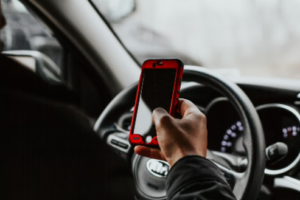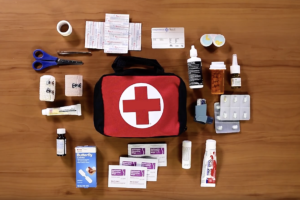When driving through Texas, you never know what you may encounter. Whether you’re on your normal route to work or driving across the state on a road trip, there’s no shortage of surprises that you may experience along the way. It’s important to prepare yourself to handle emergencies that you may have or potentially help someone else in need. We’ve created this car checklist to help you stock your car with everything you might need on the road.
Phone Charger

Image via Unsplash by melissa mjoen
Most people depend on their cell phones to help them stay connected with other people and navigate on the road. A car charger allows you to charge your device as you drive, helping ensure your battery remains full in case of an emergency. It may also be helpful to keep a portable charger to use if your battery is low and your car brakes down, preventing you from using your car-powered charger to refuel your phone.
Owner’s Manual
An owner’s manual provides you with essential information about your car, such as the appropriate PSI levels to maintain or what to do if a particular light appears on your dashboard. Consider keeping this somewhere convenient, such as your glove box or center console. This helps prevent any confusion in case of an emergency, and it may help determine what may be wrong with your car.
Important Documents
Be sure to always keep your insurance and registration information in your car and keep them together. It may also be helpful to keep contact information for a car repair company and all records of your car repairs and maintenance in your car. Keeping all of these items together in your car provides a convenient place for you to look for important information about your car, which may be especially helpful if you’re trying to sell your car or it requires significant repairs.
Jumper Cables
Jumper cables are a staple for any car emergency kit. With the help of another car, these cables help you restart a dead battery, providing you with enough charge until you can seek professional advice about your battery. It may also be helpful to keep an emergency battery booster on hand, which is a portable jump starter that allows you to start your battery without the assistance of another vehicle.
Spare Tire, Lug Wrench, and Tire Jack
Flat tires can be frustrating, but keeping a tire jack, lug wrench, and spare tire in your car can help prepare to change it yourself. Depending on your car, you may also need a lug nut key to unlock the lug nuts. Be sure to check your spare tire often to ensure it’s properly inflated for when you may need to use it.
Tire Pressure Gauge
A tire pressure gauge helps you assess how much air your tire needs. While many vehicles include digital readings of your tires, it may be helpful to check them yourself routinely. Maintaining proper tire pressure helps maintain the lifespan of your tires, and you can refer to your owner’s manual to find out the appropriate PSI for your tires. As you check the pressure of your tires, it may also be beneficial to check the tread.
First Aid Kit

A first aid kit may be useful in an emergency or for small instances that may happen when you’re away from home. At a minimum, stock your first aid kit with supplies like bandages, gloves, gauze pads, medical tape, antibiotic ointment, scissors, and antibacterial spray. Other items that may be helpful to keep in the kit are alcohol cleaning wipes, tweezers, antiseptic, and supplies for your particular medical needs.
Flashlight
Keep a flashlight somewhere convenient, such as your center console, so you have easy access in the event of a breakdown, and be sure to keep spare batteries with it. The flashlight may be helpful for changing a tire in the dark. At a minimum, look for an LED flashlight that provides lots of illumination. If you’re looking for something more powerful, consider a tactical flashlight. Many first responders use these flashlights, and they provide a significant amount of light and may double as a self-defense tool if necessary.
Multi-Tool Device
A multi-tool device provides you with a range of tools without requiring a significant amount of space. These convenient tools often include tips like screwdrivers, scissors, sharp edges, pliers, and files. Be sure to research your options to select the device that features the ends you need most.
Reflective Emergency Triangles or Flares
Incidents may occur overnight, and it’s important to alert other drivers of your presence on the shoulder or road. Setting up reflective emergency triangles or flares can help enhance your visibility as you handle your emergency. If you choose to use flares, be sure to keep matches in your car, too.
Duct Tape
Duct tape is a diverse tool that may be helpful when you’re in a pinch. It may help as a temporary fix for breaks, cracks, and leaks. Consider keeping a waterproof tarp, zip ties, and a pair of scissors to improve your options for quick fixes.
Cleaning Supplies
Keep a stash of cleaning supplies and personal hygiene items in your car to help keep your car tidy and prevent frustrations. Some cleaning supplies that may be helpful to have with you include plastic storage bags, rags, paper towels, trash bags, cleaning wipes, and reusable shopping bags. For personal hygiene, it may be useful to keep hand sanitizer, facial tissues, baby wipes, and toilet paper in your car.
We’ve reached the end of our list of important things to keep in your car. We hope this list gave you some good ideas for what to have in your car to help prepare you in case of an emergency. If you feel like we’re missing something from the list, contact us today to let us know. We may even update our list with your suggestion. At Huffines Kia Corinth, we proudly serve Corinth, Texas, and the Dallas-Fort Worth area, and we’re happy to be part of the community and your friend in the car business.
